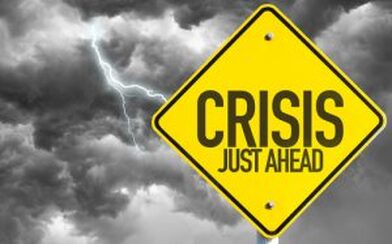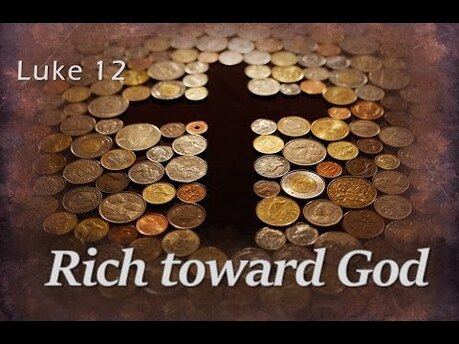
Sunday, August 18, 2019
First Congregational Church of Cheshire
© the Rev. Dr. James Campbell
Luke 12:49-56
“I came to bring fire to the earth, and how I wish it were already kindled! I have a baptism with which to be baptized, and what stress I am under until it is completed! Do you think that I have come to bring peace to the earth? No, I tell you, but rather division! From now on five in one household will be divided, three against two and two against three; they will be divided: father against son and son against father, mother against daughter and daughter against mother, mother-in-law against her daughter-in-law and daughter-in-law against mother-in-law.”
He also said to the crowds, “When you see a cloud rising in the west, you immediately say, ‘It is going to rain’; and so it happens. And when you see the south wind blowing, you say, ‘There will be scorching heat’; and it happens. You hypocrites! You know how to interpret the appearance of earth and sky, but why do you not know how to interpret the present time?
+++
A few years ago, Marcos and I attended a family reunion in Indiana. It was predicated on the fact that both my parents were turning 80. And so, on the appointed day, in a restaurant banquet room, fifty relatives from both sides of the family gathered. While on one hand I was excited to renew ties with folks I hadn’t seen in decades. On the other hand, there are some folks you shouldn’tsee for decades!
I had a handful of concerns about how it all might go, but among the biggest was the fear that conversations about the good old days might turn into conversations about these political days in America. I knew that tempers would flare if that happened, and so I had a prepared a response in the event that anyone tried to engage me in a political conversation I didn’t want to have. I would simply say: “Today is about my parents. Let’s focus on them.” And if that didn’t work, then I would excuse myself and walk away.
I came up with this plan in advance because I am, by nature, conflict averse. I may have opinions about all sorts of things, but I would prefer not to discuss most of them. It just doesn’t seem worth it to me, knowing how entrenched most of us are; how much we don’t really listen to each other; how much we prefer preaching to the choir.
So, you can imagine my relief and delight when on the morning of the big event, my mother announced (as only my mother can) that there would be no discussion of politics… or religion. My father, the retired Baptist minister, was flabbergasted by my mother’s edict. “What are all the preachers in this family supposed to talk about if even religion is off the table?” he wanted to know. “Pop,” I replied, “there’s a lot more to talk about than religion... or politics.”
And that’s the truth. There is so much more to talk about. We’ve just gotten out of the habit. We have so taken to yelling at one another and judging one another that we’ve actually come to enjoy it. One of the wonderful things about a church like ours, with folks who have all kinds of opinions about all kinds of things, is that we learn to be community with people different from ourselves, and to talk about other important things. That is one of your gifts to me.
So I delighted by my mother’s decision because I didn’t want to have an uncomfortable conversation with anyone that day. Truth is, I don’t want to have an uncomfortable conversation with anyone on any day. -- But the unintended consequence of this unwillingness to discuss anything controversial is that society’s problems, so often tied to one’s religious or political points of view, are left unchallenged. Harmony at all costs can exact a very high societal price.
And it was a price Jesus was not willing to pay. Jesus was alwaystalking about politics and money and religion – all the things that really honk people off. He did it so often and so provocatively that it was considered dangerous by those who ran the show. In the end, they killed him just to shut him up.
Today’s lesson is an excerpt of a long-running argument about religion and politics between Jesus and the religious establishment. And in order to understand them, you really have to understand the setting. Jesus had begun his last ever journey ever into Jerusalem. So he must have felt fear and dread, and a sense of inevitable destiny. So there was that pressure. And Luke says that the Pharisees, who were never friendly to Jesus, began to be even more hostile. They were cross-examining him at every turn, lying in wait to catch him in something he might say, intent on twisting his words and destroying his influence. So there was that pressure too. In addition to this, Luke says that the crowd that day numbered in the thousands. People pressed against him and demanded his attention and made it difficult for him to move. And worse yet, the crowd had trampled some folks trying to get close to Jesus. And all of these pressures seemed to converge in this one moment, pushing Jesus right over the edge.
Suddenly, he raised his voice and no doubt stunned everyone into silence by shouting: “I came to bring fire to the earth, and how I wish it were already kindled! I have a baptism with which to be baptized, and what stress I am under until it is completed! Do you think I have come to bring peace to the earth? No, I tell you, but rather division!”
This portrait of the Savior shakes me up because it is so different from the way he is usually portrayed. Didn’t the angels sing ‘Peace on Earth’ as they heralded his birth? Didn’t he promise to leave us a peace that no one can ever take away from us? Don’t we call him ‘The Prince of Peace?’ So yes, Jesus, I do expect you to bring peace. I don’t want to hear Jesus say that he came to bring us division. We’re very good at that on our own.
So what could this all mean?
Well, it is clear in Scripture that Jesus didspeak lots of words of peace. He mended broken bodies and relationships. He taught. He touched. He loved. But he also confronted - because his message was too important to get lost in a sea of sentimentality. The peace that Jesus preached is not some warm, fuzzy feeling. It is peace based in human justice and dignity. And maybe on this day, with so little time left on the earth, he wanted to make sure that we actually heard what he had to say.
The late theologian Fred Craddock once said, “Jesus is the crisis of the world.” And what Dr. Craddock meant by that is that Jesus calls us all to moments of decision. And sometimes those moments are uncomfortable because the Gospel of Jesus stands in judgment over allthe systems that rule the world. And he asks us to choose his way – the way of loving our neighbors just exactly as we love ourselves – over every other way.
Today we rejoice in the baptisms of Lance and Logan. But even in midst of that joyous moment, did you hear the Gospel of Crisis referenced in the liturgy? We asked the boys’ parents an ancient question that the church has used in baptismal liturgies since the beginning: “Do you renounce the powers of evil and desire the freedom of new life in Christ?” In other words, there is a decision to make about the way you will live in relation to everyone else on this planet. Choose wisely.
I don’t like conflict, but sometimes a conflict is exactly what I need to move me off center and to snap me to attention. And that means that a conflict can create a greater good. A conflict can be a tool of reconciliation. But what a conflict can never, ever be is a goal. And that, it seems to me, is where we are stuck today. We’ve come to enjoy the conflict far too much. We’re not even on the lookout for what comes afterward the conflict is over.
On this day, and others, Jesus stirred up trouble. He preached a Gospel of Crisis. And he did that because he was remaking the world. And then he gave us the Holy Spirit, so that we could keep on remaking it.
We all long for harmony and unity and peace. But staying quiet because we are uncomfortable; turning a blind eye to injustice and cruelty, is not how you get there.
Jesus is the crisis of my world, because he will not leave me with a false sense of peace. Instead he calls me and you to a life a meaning and purpose, not just for ourselves, but for the world that he so loved that he gave his life.


 RSS Feed
RSS Feed